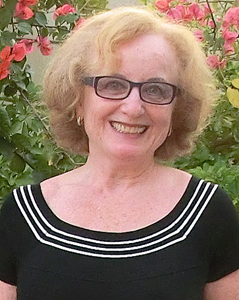
Marianna Bergida
Marianna Bergida grew up with little knowledge of most of her family – her mother, sister, cousins, grandparents, aunts and uncles were killed in Auschwitz when she was very young, and her father couldn’t speak about his own experiences during the Holocaust. Determined to not let other descendants of survivors lose their family history as she had, Bergida became an interviewer for the Shoah Foundation and ended up interviewing one of the real-life inspirations of Steven Spielberg’s film Schindler’s List.
A retired middle school teacher living in Munich, Bergida said she heard from her Jewish congregation about the Shoah Foundation and that it was looking for interviewers. At first, although she knew it was an exciting and important project, Bergida didn’t want to participate. She still felt anxiety about the topic of the Holocaust and didn’t think she could handle listening to the survivors and their fates.
However, Bergida wanted to help survivors’ children and their children’s children know their family’s histories. Her own father had avoided talking about the family completely while Bergida was growing up.
“Soon my conversations with the survivors drew me in like a magnet,” Bergida said. “I wanted to help them bear witness for their family and the next generation while at the same time have them help me confront the topic and perhaps be able to acquaint someone else with something about my own family.”
Bergida conducted about 70 testimonies in Germany. The longest interview (10 hours) was with Mietek Pemper in 1997, who was forced to work as Amon Goeth’s secretary at Plaszow concentration camp. Goeth was the commandant of the camp and was infamous for his shocking acts of cruelty and brutality toward the camp inmates.
In Schindler’s List, the character of Itzhak Stern, Oskar Schindler’s accountant, was a combination of the real-life Stern and Pemper. It was Pemper who typed “Schindler’s list,” among other acts of defiance.
Bergida remembers Pemper as not very tall but with a “larger-than-life personality with lively, clever eyes and a phenomenal memory.” He had made it his life’s work to share his story, she said, and used his near-photographic memory to testify against Nazis. He was always careful to emphasize that he did not work for Goeth willingly, so no one could think he was an accessory to Goeth’s crimes or was simply trying to save himself.
Throughout the interview, Bergida said Pemper avoided talking about his personal life or his feelings. At the end of the interview, she begged him to let her ask one personal question, which he could choose not to answer: Why had he never married?
“He allowed the question and answered that it was a conscious decision. He had to witness so much inhuman torment that parents had to suffer out of worry for their children during the Shoah that he did not want to ever fall into a situation like that himself,” she said. “At this moment, he was not Pemper the witness but Pemper the man, and it was a powerful moment in his interview.”
Conducting interviews for the Shoah Foundation was one of the most important and “emotionally intense” times in her life, Bergida said. Helping survivors leave behind their stories for their families and descendants allowed her to confront her own family’s fate and freed her from the “paralyzing fear” she had always felt about the Holocaust.
“That in the end such an enormous number of interviews were collected, that they were archived for the next generation, that they are being used for research and educational purposes, and that so many people are involved to keep us from forgetting —I never imagined when I was conducting those interviews,” Bergida said. “I can only say, everyone who has made this possible and who still works tirelessly earns our admiration, our respect, and our thanks.”